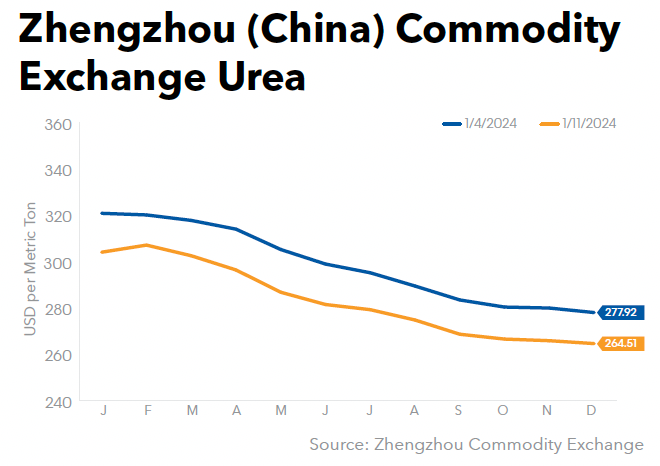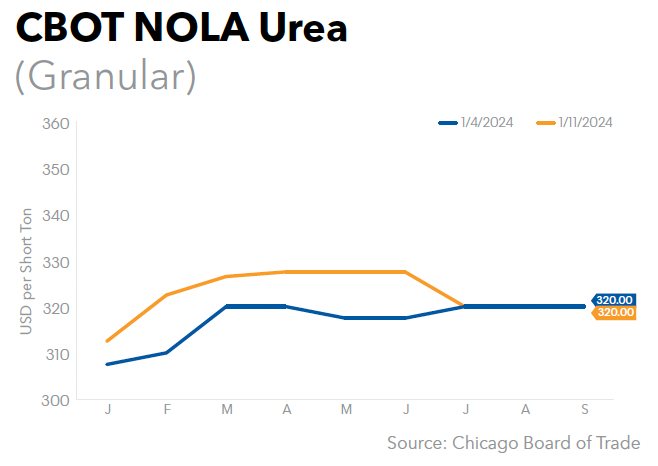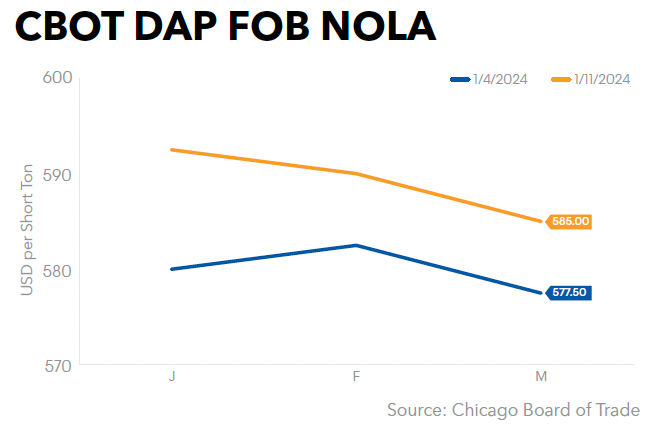Fertilizer Futures



Indiana-based cooperatives Ceres Solutions Cooperative Inc. and Co-Alliance Cooperative Inc. announced on Jan. 10 that the boards and members of both organizations voted overwhelmingly to approve a merger, which will combine the companies under the Keystone Cooperative Inc. name on March 1, 2024.
Keystone Cooperative will serve customers in Indiana, Ohio, Michigan, and Illinois with a workforce of more than 1,700 employees. The farmer-owned cooperative will have four core divisions – Energy, Agronomy, Grain, and Swine and Animal Nutrition – with expected annual revenue of $3 billion. The company will be headquartered in Indianapolis, Ind.
“Keystone Cooperative brings together two financially strong, legacy-rich, and highly successful cooperatives. This historic merger creates a cooperative that is equipped to navigate the ever-changing markets of today’s agriculture and energy industries,” said Kevin Still, current President and CEO of Co-Alliance, who will become President and CEO of Keystone.
“This powerful combination will build a cooperative that maximizes efficiencies, capitalizes on technology, and has the resources to enhance our customer experience while preparing for the needs of our future stakeholders,” Still said.
Co-Alliance and Ceres Solutions Cooperative announced on Nov. 29 that they had reached an agreement to pursue a merger (GM Dec. 1, 2023) following a three-month due diligence period that began in September (GM Sept. 1, 2023).
“Our membership has recognized the value of this combination, and we are looking forward to achieving our promise of a cooperative that is focused on the success of our members, the vitality of our rural communities, and providing an unparalleled return for our farmer-owners,” said Jeff Troike, current CEO of Ceres Solutions, who will serve as Executive Vice President of Keystone along with Scott Logue, Co-Alliance’s current Executive Vice President.
Based in Indianapolis, Co-Alliance is the result of the merger of five cooperatives in 2002, but its roots date back to the 1920s. The company provides agronomy, propane, fuels, grain, seed, hog production, and feed products and services from 79 locations in Indiana, Michigan, and Ohio, with approximately 51 of those dealing with agronomy.
Formed in 2007 as a partnership of local farmer-owned cooperatives, Ceres is based in Crawfordsville and has more than 750 team members in 37 counties across Indiana and Michigan. Ceres operates 65 locations with approximately 41 providing agronomy and/or fertilizer. Ceres added T&T Fertilizer Inc., Goshen, Ind., in 2020 (GM Feb. 7, 2020), and also completed mergers with North Central Co-op, Wabash, Ind., in 2017 (GM Aug. 18, 2017), and Falmouth Co-op in northern Michigan.
Ceres and Co-Alliance are already partners in Endeavor Ag & Energy, a joint venture that provides agronomy, propane, and feed services in north-central Michigan.
“Our
successful partnership with the Endeavor business in Michigan helped exhibit
the collaborative capacity of our organizations,” said Rick Brubaker, Chairman
of Ceres’ Board of Directors. “We look forward to seeing this team find even
more synergies with our broader businesses.”
CHS Inc. reported net income of $522.9 million on revenues of $11.4 billion for the first quarter ended Nov. 30, 2023, down from the prior year’s record $782.6 million and $12.8 billion, respectively. The cooperative posted record earnings of $1.9 billion for the year-ending Aug. 31, 2023 (GM Nov. 10, 2023).
“CHS earnings were strong for the first quarter, despite a relative decline from last year’s record earnings,” said Jay Debertin, CHS President and CEO. “Our focus on execution and efficiency improvements bolstered results across all operations. We continue to see the benefits of our diversified ag and energy portfolio, our strategic footprint, and investments in our supply chain.”
Nitrogen Production pretax earnings were $36.5 million, down 62% from the year-ago $96.9 million, reflecting lower equity income from CF Nitrogen due to decreased UAN and urea market prices.
Ag segment pretax earnings were $169.7 million, off 41% from the year-ago $287.3 million. Revenues were $8.7 billion versus the year-ago $9.6 billion.
CHS reported increased demand for wholesale and retail agronomy products. Wholesale crop nutrient sales volumes were up 16% during the quarter, to 1.87 million st from the year-ago 1.61 million st. However, selling prices remained lower due to global market conditions.
Robust meal and oil demand drove strong earnings in the oilseed processing business that were offset by weak US export demand for grains and oilseeds. Margins were down for grain, oilseed, and oilseed processing. In addition to exports, margins were also impacted by mark-to-market timing adjustments.
“The success of our domestic soybean and canola processing business and our international origination capabilities have helped us add value to our farmer-owners’ businesses,” Debertin said.
Energy pretax earnings were $266.8 million, down 33% from the year-ago $396.6 million. Total revenues were $2.92 billion, down from $3.34 billion. The unit experienced favorable market conditions in its refined fuels business, reflecting sustained global demand. Refining margins, however, decreased compared to the highs in the previous year due to trade flows returning to more normal levels.
CHS reported favorable costs for renewable energy credits and higher margins in the propane business.
The SK Group-backed climate technology company 8 Rivers Capital LLC’s $1 billion Cormorant Clean Energy Project in Port Arthur, Texas, is expected to produce 880,000 mt/y of low carbon, blue ammonia, according to Bloomberg. Fluor Corp., Irving, Texas, was awarded a contract for front-end engineering and design (FEED) and procurement services for the project last fall (GM Oct. 13, 2023).
The plant will use proprietary oxy combustion technology, which 8 Rivers said captures CO2, eliminates emissions, and lowers production costs. It is expected to break ground in 2025 with commercial operation beginning in late 2027, according to Chief Operating Officer Steve Milward.
Ammonia produced from the plant will be sold at auction in South Korea, which has prioritized the fuel as a feedstock for coal-fired power plants, Milward said. Adding ammonia to coal in the production process, or “co-firing,” is part of the country’s decarbonization strategy. “There is going to be a very large demand for ammonia, I would say multimillion tons over the next decade into Korea,” Milward said in an interview with Bloomberg.
The emissions reduction benefit of this process has been challenged by some scientists, partly because burning ammonia can produce nitrous oxide emissions, a potent greenhouse gas. In addition, low-carbon ammonia is expensive to combust, according to Adithya Bhashyam, an associate on BloombergNEF’s hydrogen team.
“While it’s something that has received a lot of political support in Japan and Korea, in particular, and some other Southeast Asian countries, we think the economics are really challenging,” Bhashyam said.
Nigeria’s Economic and Financial Crimes Commission (EFCC) raided the offices of Dangote Group, Lagos, on Jan. 4, according to Bloomberg. The company, owned by Aliko Dangote, believed to be Africa’s richest person, is a major multinational industrial conglomerate involved in several businesses, including nitrogen fertilizer, oil, cement, and sugar.
Dangote Group in a statement said that it has faced no accusations of wrongdoing and called the incident an “unwarranted embarrassment.” It had no further comment. EFCC has yet to issue a comment.
The news sent panic through Nigeria’s corporate board rooms. “Manufacturers are concerned that if this can happen to Dangote, it can happen to any one of them,” said Segun Ajayi-Kadir, Director-General of the Manufacturers Association of Nigeria. “They are worried.”
Slamming the EFCC for the aggressive nature of its tactics, the association said currency allocations to more than 50 companies were under scrutiny and warned of a chilling impact on the economy.
“This news has gone around the world and many, including would-be investors, would be taken aback,” Ajayi-Kadir said in a separate statement. “This may not be the best way to show that Nigeria is committed to good corporate governance.”
Nigerian dollar bonds maturing in 2025 have fallen for seven consecutive days to the lowest since Nov. 28, their longest losing streak since September, suggesting that investors are watching what happens next.
Days before newly elected President Bola Tinubu took office in May 2023, Dangote opened its huge oil refinery to great fanfare. However, Tinubu was not among the attendees, though outgoing President Muhammadu Buhari and other heads of state were present.
The EFCC is expected to focus on the funding of the $18.5 billion refinery, which was built by Dangote and was granted access to money from the country’s central bank.
“It’s basically a signal to the business community that this government will go after anyone who they perceive may have the means to help fill the dollar gap in the government’s coffers,” said Cheta Nwanze of Lagos-based strategic consultancy SBM Intelligence.
To corporate Nigeria, it was also an unmistakable message about who was in charge. The raid came on the heels of Tinubu’s New Year’s Day speech in which he promised to “remove any clog hindering our path to making Nigeria a destination of choice for local and foreign investments.”
The EFCC’s raid on Dangote’s headquarters three days later triggered a scramble across Nigerian boardrooms to check their dealings with the central bank under Godwin Emefiele, who led it from 2014 until his ouster in June 2023.
Tinubu was highly critical of the forex practices of the central bank as he campaigned for the presidency last year, and suspended Emefiele within weeks of taking office. The central banker was arrested soon after on charges including fraud. He was taken into custody and released on bail last month.
A separate probe of Emefiele by a Tinubu-appointed special investigator has accused him, among other things, of manipulating the naira via a complex foreign-exchange regime.
Emefiele, a former governor, has denied wrongdoing. His trial on the initial charges is ongoing and no findings have been proven. He has not yet been formally charged in connection with the allegations raised by Tinubu’s special investigator.
Chemicals distributor Shrieve Chemical Co., The Woodlands, Texas, a portfolio company of Gemspring Capital, Westport, Conn., on Jan. 8 announced that it has acquired TLC Ingredients (TLC), Crest Hill, Ill., a distributor of food ingredients, industrial chemicals, and phenolic resins. Terms of the transaction were not disclosed.
Shrieve said the acquisition of TLC, which has a facility in the Midwest, expands Shrieve’s presence in the region and enhances the company’s ability to serve the growing food ingredients end-market. Additionally, it positions Shrieve to leverage its existing product lines to serve TLC’s high-growth specialty industrial customers who have relied on TLC, which was founded in 2001, as a supplier of Durez phenolic resins for more than two decades.
“I am thrilled to welcome TLC Ingredients to the Shrieve Chemical family,” said George Fuller, Shrieve CEO. “This acquisition underscores our commitment to excellence and focus on long-term growth as we look to thoughtfully increase our presence and the value-added services we can provide across the country.”
“The TLC team has built an exceptional business with an industry-leading distribution facility, long-standing supplier relationships, and a broad product offering that serves several attractive global end-markets,” Fuller continued. “TLC’s expertise, innovative approach, and customer focus aligns very well with our broader strategic vision. Together, we look forward to delivering enhanced value to our customers and supplier partners.”
DP World (Canada) Inc., part of the Dubai-based global logistics and trade solutions provider DP World, announced on Jan. 9 that it has signed a five-year management contract with Canpotex for operations at Canpotex’s terminal in the port of Saint John, New Brunswick.
Under
the new agreement, DP World said it will be responsible for potash handling
from Canpotex’s railcars, storage, inventory management in the warehouse, and
loading ships destined for overseas markets. The existing Saint John team will
provide expertise and oversight to ensure the safe and environmentally sound
handling of Canpotex potash.
Canpotex’s Saint John dry bulk handling terminal has approximately 2 million mt
of annual throughput capacity and two storage facilities with a combined
storage capacity of around 210,000 mt, according to Canpotex’s website.
“The
Port of Saint John is an integral part of Canpotex’s supply chain,” said
Canpotex President and CEO Gordon McKenzie in the DP World media statement. “We
are proud to work with DP World to ensure Canadian potash reliably reaches our
customers overseas and help make global food security possible.”
Canpotex has a fleet of more than 8,000 railcars and access to three other
marine terminals in North America: Neptune Terminals in the port of Vancouver,
Portland Bulk Terminals LLC in the port of Portland, Ore., and Thunder Bay
Terminals in the port of Thunder Bay, Ont.
The Boards of Directors of GROWMARK Inc. and CHS Inc. announced on Jan. 12 that they have jointly agreed to conduct an exploratory process over the coming months to identify opportunities for the two cooperatives to further collaborate to better serve owners and customers.
The two farmer-owned cooperatives have a long-standing relationship and have partnered before on strategic projects, including the formation in 2021 of Cooperative Ventures, a venture capital fund focused on supporting advancements in breakthrough technologies for agriculture. GROWMARK is headquartered in Bloomington, Ill., and CHS in St. Paul, Minn.
While the outcome of the exploratory process is not yet known, the two companies said they are seeking further collaboration to improve agriculture, invest in technology, and bring new solutions to customers.
“Continuing our long history of adding value to our members and customers, while ensuring a strong and vibrant cooperative system for the future, is critical to the GROWMARK System,” said GROWMARK CEO Mark Orr. “Our partnership with CHS in Cooperative Ventures is a great example of cooperation amongst cooperatives that benefits the shareholders of both companies.”
“We believe that by working together we can better serve our farmer- and cooperative-owners,” said Jay Debertin, CHS President and CEO. “Ultimately, we aim to better meet customer demand for our owners’ products around the world and increase the value of the cooperative system.”
Mosaic Fertilizantes is planning the construction of a new blending, storage, and distribution unit in Palmeirante (TO) in Brazil, as well as in a long-term railway transportation agreement, according to Toledo Marchetti Advogados, an attorney who assisted the company in the negotiations.
The project will be located within the Palmeirante Integrator Terminal (TIPA), which has a direct railway connection to the Port of Itaqui (MA), where imported raw materials for fertilizer production will arrive. Mosaic had not returned inquiries at press time.
Mosaic Fertilizantes will invest R$400 million in this new unit, with a production capacity of 500,000 mt/y, potentially reaching an annual production of 1 million mt by 2028. Additionally, the facility will have a warehouse for up to 100,000 mt. The project will employ around 200 people during its operational phase.